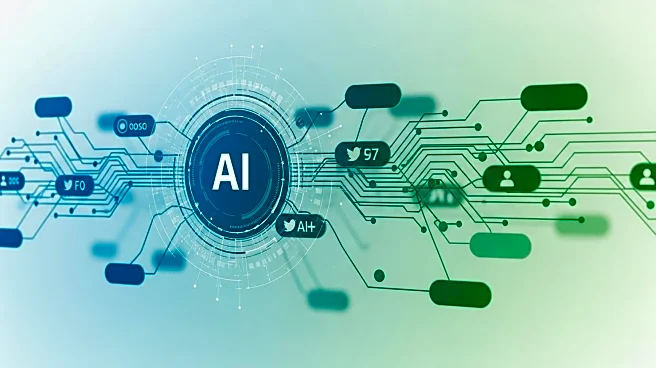What's Happening?
OpenAI and Meta have launched new AI-driven social media platforms, Sora and Vibes, respectively. These platforms aim to integrate AI into social media feeds, offering features like AI-generated videos and chatbots. The introduction of these tools has sparked concerns regarding copyright infringement and the spread of misinformation. OpenAI's Sora app has faced criticism from the Motion Picture Association for hosting videos that infringe on copyrighted content. In response, OpenAI plans to provide rights holders with more control over character generation and is exploring a revenue-sharing model. Additionally, both companies have implemented measures to prevent deepfakes and protect young users from harmful content.
Why It's Important?
The integration of AI into social media represents a significant shift in how content is created and consumed online. This development could redefine the landscape of social media, influencing how tech companies monetize AI technologies. However, it also raises ethical and legal questions about content ownership and the potential for AI-generated misinformation. The platforms' ability to create lifelike videos could exacerbate existing concerns about the authenticity of online content. Furthermore, the impact on young users' mental health is a critical issue, as AI chatbots have been linked to negative outcomes in some cases. The industry's response to these challenges will shape the future of digital communication.
What's Next?
OpenAI and Meta are expected to continue refining their AI tools to address the concerns raised by stakeholders. OpenAI plans to enhance its content generation controls and explore revenue-sharing models to mitigate copyright issues. Both companies will likely focus on improving safety measures to protect users, particularly minors, from harmful content. As AI-driven social media evolves, tech giants may face increased scrutiny from regulators and advocacy groups, prompting further adjustments to their platforms. The ongoing development of these technologies will be closely watched by industry experts and the public alike.
Beyond the Headlines
The rise of AI in social media could lead to broader cultural shifts, influencing how individuals interact online and perceive digital content. As AI-generated content becomes more prevalent, users may need to develop new skills to discern between real and synthetic media. This evolution could also impact the role of influencers and content creators, as AI tools offer new ways to produce engaging content. The ethical implications of AI-driven social media, including privacy concerns and the potential for manipulation, will remain a critical area of discussion as these platforms gain traction.











